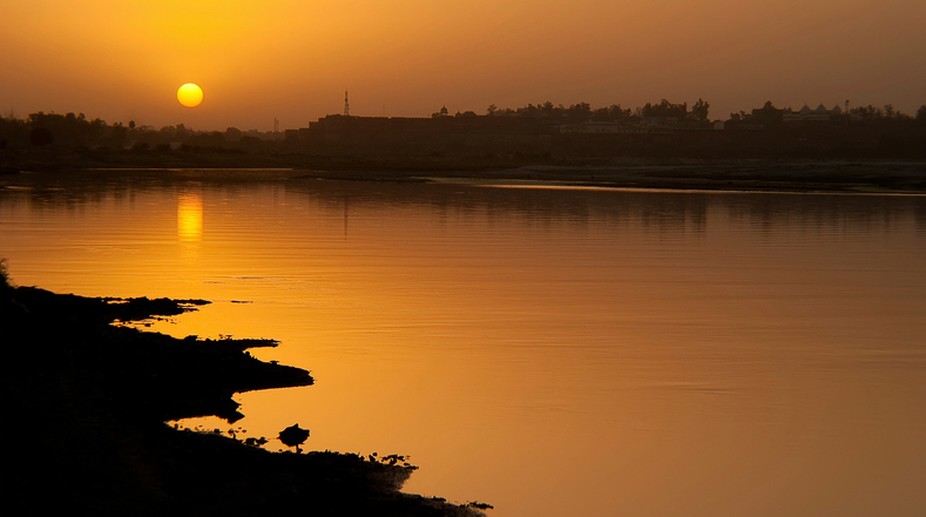Delhi commissions Asia’s largest single-stage wastewater treatment plant at Okhla to rejuvenate Yamuna
In a historic step towards making the Yamuna River clean and free-flowing, Delhi has made a significant advancement in sewage treatment.

River Yamuna (Getty Images)
Afew steps down Ghat number 24 in the bustling Yamuna Bazaar of Delhi, flows the river that was once the linchpin of the capital's urban life.
The deplorable state of the Yamuna is in strong juxtaposition to the holiness attached to it. Amid filth and waste floating over the edges of the ghats, the tranquil Yamuna presents a picture completely different from popular imagination. As one’s eyes wander from the Old Iron Bridge to the seemingly endless black waters of Yamuna, a boat unfailingly catches attention.
Advertisement
Nostalgic, a boatman narrates the gradual ruination of this vocation. "Almost every household in this community used to own a boat once. But that was back in the 1980s, when Jamuna Maiyya had clear water. Never did a year go by without fairs and bazaars being organised. Those were good times”, says Ganesh, who is a part-time swimming coach and Hindu priest.
Advertisement
When asked why he juggles between several trades, he innocently answers that there's a scarcity of regular customers, who want to enjoy a boat-ride along with touring Yamuna. For the boatmen along the ghats of the Yamuna, ferries are rare and income uncertain. Most of them take up multiple jobs to survive, the common ones being swimming coaching and construction site masonry.
Baksheesh Sachar, an AUD graduate and a research scholar at Centre For Civil Society, said, "The very reason of these dwindling livelihoods is the pollution in and around the river. Any kind of waste ~ industrial, domestic, agricultural ~ produced in Delhi, finds an end point in the Yamuna. There used to exist a time when everyone along the ghats had boats but today only a handful of inhabitants living along the Yamuna river own a boat. Even swimming competitions were organised, but now they seem impossible, given the state Yamuna is in."
The mallah community, which comprised traditional oarsmen, have now sought refuge in educating their children, rather than carrying forward the lineage in the face of a fickle trade.
Once on the ride, a fraillooking man whizzed past, with a make-shift plastic raft full of sticks of all lengths. That was Alibaba, resident of a slum basti nearby. As Ganesh jokingly referred to him as the "aquatic ragpicker", he mentioned that there are many like Alibaba, who rummage through the river for pieces of metal and other saleable material.
They look for coins and metallic murtisthat are immersed in the river, to sell to scrap dealers for a meagre price. The money they make everyday is insufficient for them to rise above a hand-to-mouth existence.
The naaviks, or boatmen, along the shore of the Yamuna also help the police retrieve dead bodies from the riverbed. Not only that, they rescue drowning people and animals.
One of the amateur swimmers said, "Just last night I saved a woman, who was attempting suicide. These cases are more common than you can imagine." Almost all children here are taught swimming once they reach the appropriate age. Many even choose to train others for a living.
The ghats are also objects of cinematic interest. Many boatmen engage in facilitating movie shootings along these ghats. Apart from ferrying crew and equipment, they also appear in documentaries and films about the Yamuna. Shyam, another rower, proudly boasts that he has featured in myriad "phillams".
He dreams of becoming a household name, when he gets his big break. He despairingly states, "My family has been residing here since 70-80 years. The boating tradition used to be a way of life for us. A large community lives here and almost every household had at least one boat. The melas were occasions of fun and frolic. Now if you look around, you would hardly see five or six boats." A large portion of boatowning families have sold their boats to boat enthusiasts, wood-scrap dealers and workers who make bridges.
Adjoining the polluted Yamuna is the crematorium Nigambodh Ghat. Elaborate funeral rites produce material that has to be disposed of in the Yamuna for spiritual reasons.
This is another area where the boatowning community comes in the picture.Visitors often travel away from the shallow end to a deeper mid-section, using boats. How often do they ply the waters then? Well, not too often. Ganesh said it is either for ritualistic purposes like murti-visarjan(idol immersion) or to row to the other side to an auspicious temple. The coin collectors have make-shift rafts, which allow limited mobility.
Sometimes, he said, income from seasonal tourists covers up for the entire day, but such days are infrequent. He laughed when asked if he overcharged tourists.
The situation in other states is not as grim, where boatmen still find customers, but the ever-rising pollution and dwindling incomes are fast eroding the songs hummed by the boatmen around the Yamuna.
Advertisement
In a historic step towards making the Yamuna River clean and free-flowing, Delhi has made a significant advancement in sewage treatment.
For cleaning River Yamuna and improving other facilities in the water and sanitation sector, the Delhi government will spend Rs 9,000 crore, as announced in the budget.
Delhi Congress chief Devender Yadav on Wednesday took a jibe at the BJP government after it signed an MoU for ferry services and cruise tourism on the Yamuna, saying the ruling dispensation should first take effective steps to clean-up the “polluted” river.
Advertisement
